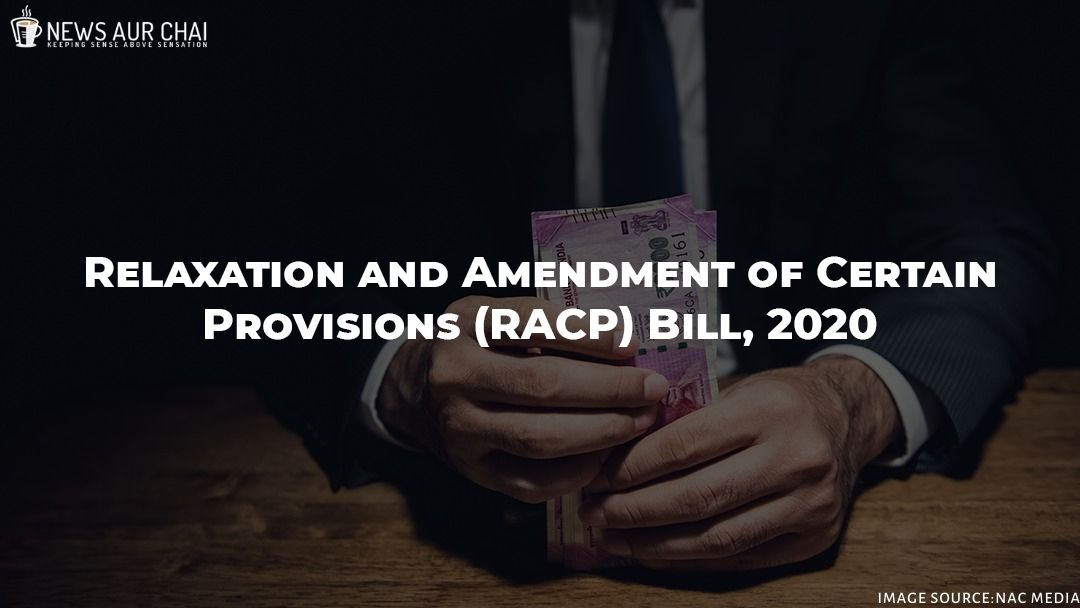
India’s Finance Minister, Mrs. Nirmala Sitharaman, have established the Taxation and Other Laws – RACP (Relaxation and Amendment of Certain Provisions) Bill, 2020 in the Lok Sabha on September 18, 2020. The RACP Bill will substitute the Taxation and Other Laws (Relaxation of Certain Provisions) Ordinance, 2020.
The Ordinance was brought into the picture in March 2020 to provide flexibilities to meet various compliances. This is done by extending the time limit and payment of taxes under the Income Tax Act, 1961 (hereby referred to as ‘the Act’) and certain other specified Laws.
The RACP Bill seeks to incorporate the provisions of Notification No. 35/2020, dated June 24, 2020, and Notification No. 56/2020, dated July 29, 2020 (issued by the Central Board of Direct Taxes under the above Ordinance) and also amend certain Sections of the Act.
Why was RACP Bill 2020 introduced?
The main reason was for it to act as a source of relief to the various categories of taxpayers during the coronavirus pandemic. ‘Other specified Laws’ include certain Finance Acts, Central Excise Act 1944, Customs Act 1962, Direct Taxes Vivad se Vishwas Act 2020, and Prohibition of Benami Property Transactions Act 1988.
Highlights of the Bill (Direct Taxes)
- Regarding the Period
|
Particulars |
Stated dates |
| Filing of the Income Tax Return for Assesment Year (AY) 2019-2020 | September 30, 2020 * |
| Filing of the Income Tax Return for AY 2020-2021 | November 30, 2020 * |
| Filing of Audit Reports (under any provision) for the AY 2020-2021 | October 31, 2020 * |
|
Tax Deducted at Source (TDS)/Tax Collected at Source (TCS) for February and March 2020 and 4th quarter for March 2020 (as the case may be, under all sub-sections) |
March 31, 2021 |
|
Furnishing of Certificate under Section 192 of the Act for AY 2020-2021 (As per Section 192 of the Act, any employer responsible for paying salary to his employees can deduct TDS on an average rate of tax, based on the current slab rates during the relevant FY, by considering the employees’ estimated income) |
March 31, 2021, {from August 15, 2020}
|
| Sections 54 to 54BG (regarding the Exemptions under Capital Gains)
a) Time limit for completion or compliance b) For making such completion or compliance |
December 31, 2020 (from September 29, 2020) March 31, 2021 (from September 30, 2020) |
| Chapter VI-A Deductions (under heading B):
a) Time limit for completion or compliance b) For making such completion or compliance |
December 31, 2020 (from July 30, 2020) March 31, 2021 (from July 31, 2020) |
| Vivid se Vishwas Act, 2020:
a) Time limit b) For completion or compliance |
December 31, 2020 March 31, 2021 (from December 31, 2020) |
*Note: – As per clause 3(1)(c) of the Bill, all due dates have been extended to March 31, 2021. However, the third proviso to clause 3(1)(c) forms an exception to the above rule. The third proviso deals with the filing of Returns for AY 2019-2020 and AY 2020-2021. For the AY 2019-2020, it states that the general due date of March 31, 2021, is substituted by September 30, 2020.
Similarly, for the AY 2020-2021, March 31, 2021, is substituted by November 30, 2020, and for the Audit Reports, the due dates will continue to be October 31, 2020. Hence, for all the items specified in the third proviso, the date specified in the condition will be the due date for compliance. For those items that do not fall in the third proviso (like the date for completion of assessments, issue of notice, filing of appeals, etc.), the last date will be March 31, 2021.
- There is no extension for the payment of taxes;
- The interest rate for late payment of taxes will be ¾ per cent per month or part thereof (only if the tax payable is more than Rs. 1 lakh);
- No penalty will be levied;
- No prosecution shall be sanctioned for the delay in the payment of taxes.
Note:- The ‘period of delay’ means the period between the due date and the time of payment.
- New provisions for charitable trusts for re-registration, etc.
Approval under Section 10(23)(c)
The re-registration under Sections 12A, 12AA, and 80G is proposed to come into effect from April 1, 2021. The previously extended date was October 1, 2020.
In addition to the above, there are other amendments proposed in the Income Tax Act, 1961.
Current status of Bill
Although the RACP Bill was passed in the Lok Sabha on September 19, 2020, it is yet to be passed in the Rajya Sabha. Once the Bill is passed in the Rajya Sabha and receives the assent of the President, the proposed amendments will gain effect.
As slowly the Bill goes into the final stage, taxpayers can hope that the amendments will be beneficial for them to stay within the legal boundary and compliances.





